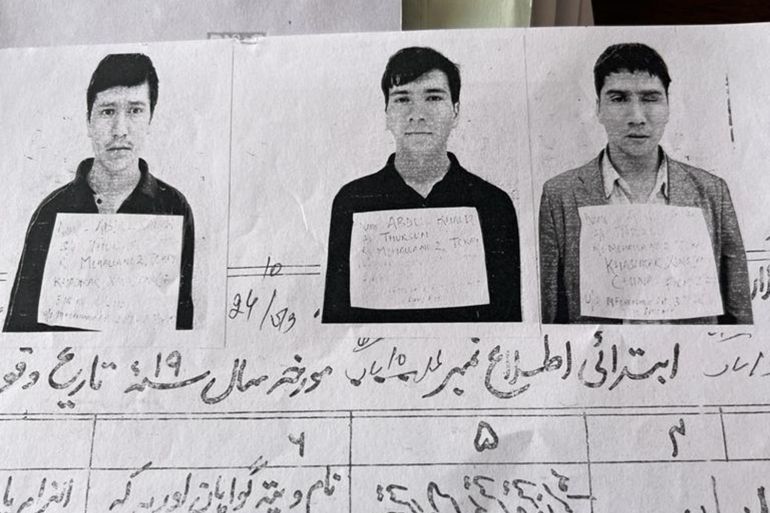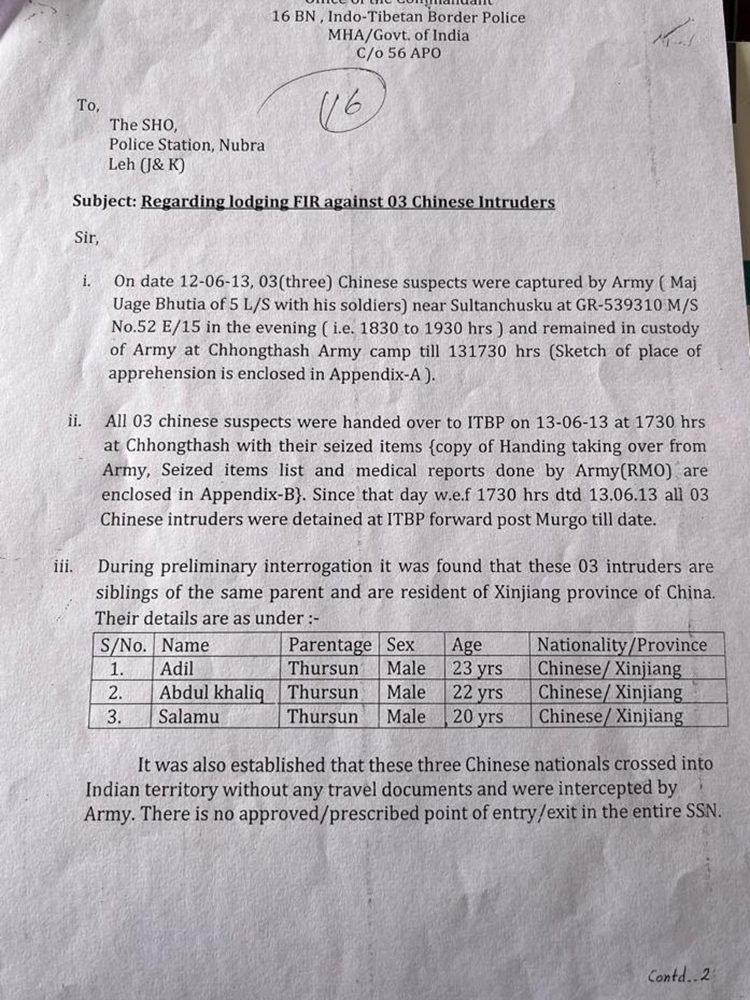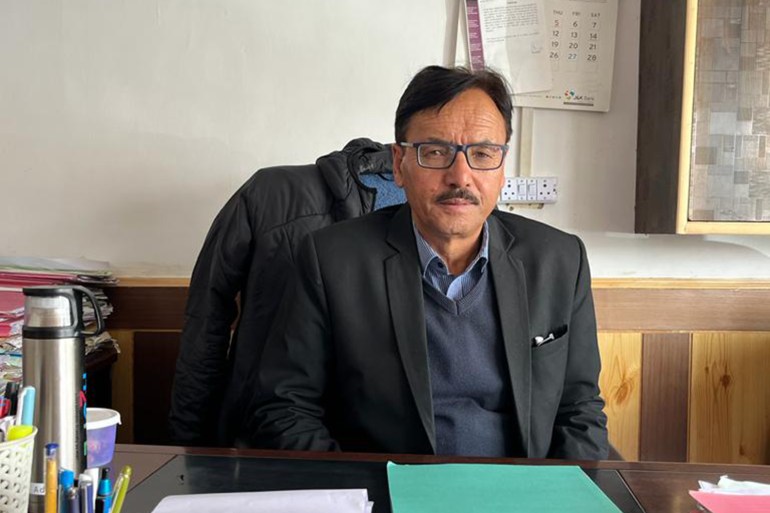Uighur siblings in India jail since 2013 face deportation threat
Three brothers who fled China’s persecution in Xinjiang and landed in Kashmir now fear New Delhi may send them back.

Jammu, Indian-administered Kashmir – In August 2013, a police officer in Nubra, one of the last inhabited valleys in the northeast of the Himalayan region of Ladakh, received an unusual communication.
In the letter, Pramanand Jha, an officer from the Indo-Tibetan Border Police (ITBP), a paramilitary force primarily deployed on India’s eastern borders, asked the police to register cases against three “Chinese intruders” who had been in the ITBP custody for nearly two months.
Keep reading
list of 4 itemsFor Uighur exiles, Kashmir is heaven
China flags Uighurs as ‘extremist’ for having Quran, report says
What will it take to stop China’s Uighur genocide?
The letter said the Chinese nationals were captured by the Indian army near Sultanchusku area along the India-China border on the evening of June 12, 2013. The three were handed over to the ITBP the next day.
Jha in his letter said their interrogation found the trio – Adil, Abdul Khaliq and Salamu – were siblings aged between 20 and 23 and belonged to China’s eastern region of Xinjiang.
In their two-month interrogation, the ITBP did not find anything against the three men except that they had crossed over to the Indian territory unlawfully.

When the police produced them before a court in September 2013, they said they did not understand the local languages.
After spending 10 months in a jail in Ladakh’s main city of Leh where the siblings picked up some Urdu and Ladakhi languages, they confessed before the court that they crossed over to India “without any travel documents and that they were in possession of knives and maps” when the Indian army apprehended them.
The court on July 22, 2014 found them guilty on three counts of trespassing and sentenced them to 18 months of imprisonment.
But who are they and why did they cross over to India?
Belonging to the Uighur community, the siblings say they are residents of Kargilik in Xinjiang which they fled after facing persecution from Chinese authorities. China is accused of committing grave human rights violations against the Uighurs, a mostly Muslim ethnic minority.
According to the United Nations, at least a million Uighurs have been put in so-called “counter-extremism centres” across Xinjiang which shares a border with Indian-administered Kashmir.
The siblings told their lawyer Muhammad Shafi Lassu they decided to flee China after some of their relatives and friends were put up in a detention centre.
“They also told me that ITBP officials mentioned their age wrongly and that they were actually 16, 18 and 20 years old, respectively,” said Lassu, a lawyer in Ladakh who is fighting their cases pro bono since he met them during a jail visit in 2014.
“When I met them in jail, I could see they were naive young boys,” Lassu told Al Jazeera. “While interacting with them, they tried to make me understand how they feared they would also be put in a detention centre and because of that they tried to flee.”
The three brothers told Lassu they were unaware of international border rules and that it could land them in jail.
“They were pleading with me in their broken words to get them released,” said Lassu. “Even the jail superintendent at that time told me they behave like kids, they play with each other, fight at times and then behave normally again.”
But what seemed like a few months of imprisonment turned into a decade-long ordeal for the Uighur siblings after Indian authorities charged them under the stringent Public Safety Act (PSA) in March 2015.
The last PSA order, issued on December 24, 2022, states that the detainees should be deported to their native country.
The PSA is a controversial law under which an accused could be detained for six months without trial. Every time their detention term expired, the authorities issued new detention orders under the same law.
Top police and administrative officials in Kashmir did not respond to Al Jazeera’s requests for a comment on the long detention of the Uighur siblings and their plans to deport them.
“It has been nearly 10 years now and they are being moved from one jail to another,” said Lassu. “These are persecuted people who landed in this situation due to extraordinary circumstances. They cannot be jailed like this forever, this is not law, this is not justice.”
Lassu has been the only person of contact for the siblings outside the jail all these years. He visits them a couple of times every year and gives them clothes or hands over gifts given by people for them.
Inside the jail, the trio seem to have got a better grip on reality. They are now fluent in Urdu, Hindi and have learned some English, said Lassu, and spend their time reading books or writing.
Since March last year, they have been lodged in Jammu city’s Kot Bhalwal jail. Lassu has requested the jail authorities to move them from Jammu due to the scorching heat in the city which falls south of the Kashmir Valley.
“Their bodies are acclimated to living in colder places,” Lassu told Al Jazeera. “Their situation in summers gets so bad that they fear they will die because of hot weather.”
The Kashmir region fell on the famous silk route and shared a close bond with Central Asia through trade and cultural exchanges. Traders from the present-day Xinjiang region would frequent the Himalayan territory, passing through perilous mountain passes.
At present, there are about 30 Uighur families in the region, mostly living in Ladakh and the Kashmir Valley.

Lassu has appealed to the Indian government to allow the siblings to live in India, home to tens of thousands of refugees, including nearly 100,000 Tibetans, Afghans and Rohingya from Myanmar.
“I have reached out to the government at different levels pleading to them to show mercy towards these people,” Lassu said. “I even wrote several letters to the prime minister. But there has been no answer.”
Citing China’s alleged atrocities against Uighurs in Xinjiang, the siblings have also petitioned India’s federal home ministry to not deport them and grant them temporary asylum until they find permanent refuge in another country. The ministry is yet to respond to their appeal.
Lassu said the siblings should not be sent back to China, fearing they could be killed there. “Sending them back to China means giving them a death sentence. They will be shot dead by the authorities there,” he said.
The lawyer said Canada’s recent announcement to take 10,000 Uighurs has given the siblings hope of permanent asylum. Since India is not a signatory to the 1951 Refugee Convention adopted by the UN, New Delhi also does not recognise the role of the UN High Commissioner for Refugees (UNHCR) within its territory and handles refugees unilaterally.
Al Jazeera reached out to UNHCR officials in New Delhi who said their job begins only after the Uighur siblings are released from jail.
“Indian authorities should be aware that the UN has found that the Chinese government’s abuses against the Uighurs can constitute crimes against humanity,” Meenakshi Ganguly, South Asia director at Human Rights Watch, told Al Jazeera.
“India should be granting protection to the Uighurs instead of treating them like criminals. Any forced return will place them at grave risk,” she said.
Back in Leh, Lassu said he feared for the future of the siblings.
“They are going through miserable mental health conditions,” he told Al Jazeera. “What is happening with them is not only illegal, but completely inhuman too. How can these young men be jailed for 10 years only because they fled persecution?”